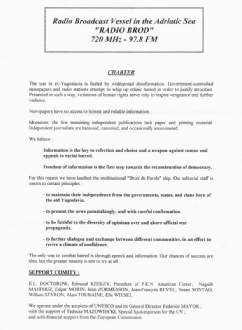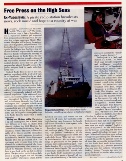© 2014-


Radio Brod - History (2)
The Droit de Parole carried a 50Kw medium wave transmitter which wa s donated to the project by Telediffusion France (TDF) and had previously been used by Sud Radio based in Andorra. Initially some interference was caused to the station's transmissions by breakthrough from the ship's marine communications equipment and the Droit de Parole had to return to port after a few days to have this rectified. Some storm damage to the ship was also repaired at the same time. By 17th April 1993 the ship had returned to sea and transmissions of Radio Brod recommenced shortly afterwards, this time also on 90mHz FM.
s donated to the project by Telediffusion France (TDF) and had previously been used by Sud Radio based in Andorra. Initially some interference was caused to the station's transmissions by breakthrough from the ship's marine communications equipment and the Droit de Parole had to return to port after a few days to have this rectified. Some storm damage to the ship was also repaired at the same time. By 17th April 1993 the ship had returned to sea and transmissions of Radio Brod recommenced shortly afterwards, this time also on 90mHz FM.
Two studios -
News was obtained by journalists working on board the radio ship via foreign press contacts, the AFP and Reuters news agencies and a network of over 40 correspondents based in Geneva, Washington, Paris and in the former Yugoslavia. Editor-
Yugoslavia. Editor-
Short news bulletins were broadcast every hour on the hour and there were three major bulletins each day in the morning, afternoon and evening. The language used for these broadcasts sometimes depended on the nature of the news, but included Serbian, Croatian and Bosnian. Two additional news bulletins were also broadcast each day, one in English and one in French, mainly for the benefit of members of the UN forces serving in the area.
A telephone number was established in Paris to enable correspondents and listeners inside and outside Yugoslavia to pass on messages to relatives and friends with whom they had lost contact during the war. This message service became a major feature of the station's broadcasts and a daily missing persons programme, "Desperately Seeking", was soon introduced. This included broadcasts of taped messages to the Paris telephone number as well as details of people living in refugee camps who wished to contact relatives from whom they had become separated.
Another major feature on the station was the hour long "Exodus" programme, broadcast three times a week, giving advice to would-
In June 1993, after Radio Brod had been on the air for less than two months, the International Telecommunications Union (ITU) received representations from the Serbian authorities in the former Yugoslavian capital, Belgrade. They alleged that the offshore station's use of the 720kHz frequency was illegal, because it was a frequency allocated to Yugoslavia and Radio Brod's transmissions were interfering with the Montenegran State Radio Podgorica. As well as this challenge on technical grounds Serbia also accused the offshore station of broadcasting only 'bad' news to listeners in the former Yugoslavia.
The ITU contacted neighbouring countries in the Balkans about Radio Brod's broadcasts and subsequently received a communication from the Consul of St. Vincent and the Grenadines in Monaco, who wrote explaining that a ship flying his country's flag was broadcasting from the Adriatic and asked if this was illegal in any way. The ITU informed him that under the terms of Article 422 of the 1959 Geneva Convention prohibiting offshore radio broadcasting it was illegal, but admitted that if a member country chose to ignore the Convention then there was little the ITU could do about it.
Having received this response from the ITU the St. Vincent and Grenadines Government withdrew its registration of the Droit de Parole on 28th June 1993 and Radio Brod was forced to close as its vessel was now technically stateless. Two days later the radio ship herself sailed to the Italian port of Bari, where the station had its offices based in a hotel, while the Droit de Parole organisation approached the ITU requesting the allocation of an official frequency to enable Radio Brod to resume its transmissions.
There then followed a month of discussions and negotiations with the various authorities in Europe and St. Vincent and the Grenadines. The Droit de Parole organisation explained in great detail to the Government of St. Vincent the nature of their offshore project and that it was supported and backed financially by the European Community and a United Nations organisation.
After Radio Brod had been off the air for nearly four weeks the authorities in St Vincent agreed to reinstate the ship's registration on a temporary basis for a period of three months, and consequently the station was able to return to the air at the beginning of August 1993.
When it returned Radio Brod continued to use 720kHz because the station's organisers had become totally frustrated with bureaucratic delays at the ITU over negotiations for the allocation of a new frequency. The station was also reportedly considering acquiring a 100Kw transmitter to achieve greater coverage of its target area in the former Yugoslavia.
Droit de Parole also asked the French authorities to request mainstream UN support for Radio Brod, but the new French Government, who had already refused to help the project financially, refused, quoting the 1982 UN Convention of the Law of the Sea (UNCLOS), under which they said the states of the former Yugoslavia would have the right to board the ship and stop Radio Brod's transmissions.
Although convenient to the French authorities this suggestion was somewhat misleading because the UNCLOS agreement had not at that time been ratified by the required number of states throughout the world and was not yet embodied in international law.
During the early winter months of 1993 Radio Brod obtained further funding from the European Commission and the Emergency Humanitarian Aid Office, enabling it to continue broadcasting until February 1994. However, following this additional funding allocation some questions were raised by the Dutch Government about the financial arrangements of Radio Brod and its parent organisation, Droit de Parole.
The European Commission asked British journalist, Jim Fish, to investigate the financial management of the station both on land and on board the radio ship. The report produced after this investigation showed that there was a lack of good financial management and those working on board the Droit de Parole were being paid approximately three months in arrears.
These reports of financial management difficulties were enough for the European Commission to decide not to renew funding for Radio Brod after February 1994. With the cessation of funding from its main source Radio Brod was forced to close at midnight on 28th February 1994 and organisers claimed at a press conference in Rome the following day that they had received no prior warning that backing was to cease. The station made a brief return for a few days on 7th March 1994, but closed again while new sources of funding were sought.
Ultimately this funding was not forthcoming and Radio Brod never returned to the air.


Click on picture to enlarge

History
Key Dates
Ship and Location
Technical
Staff





Newsweek
30th August 1993

The Observer 19th September 1993
Click images to enlarge

Back to Mebo off Libya

Back to Rest of the World Gallery


Back to Radio Brod
